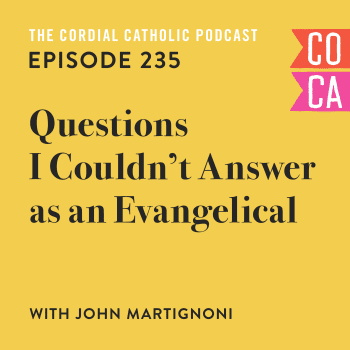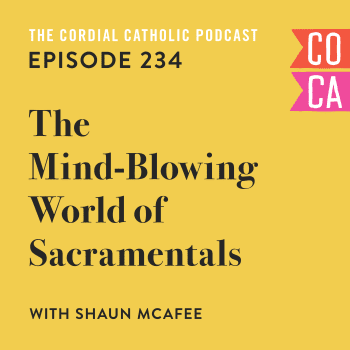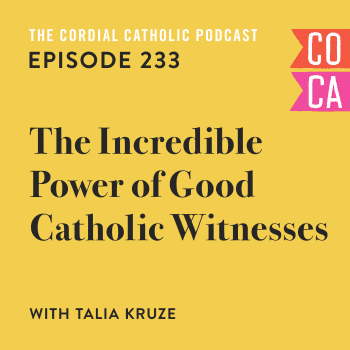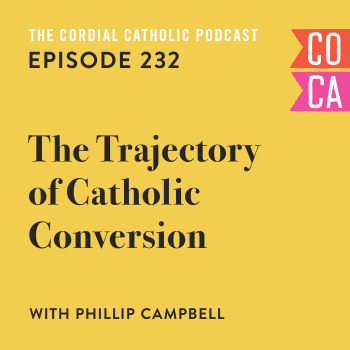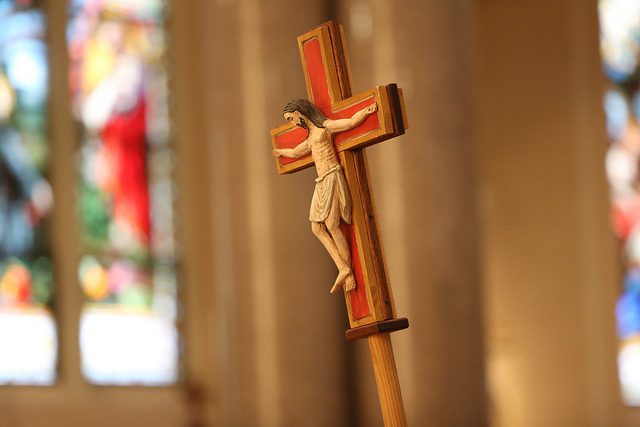
I was an Evangelical Protestant, and I loved it.
Then I became a Catholic.
As a convert, I didn’t join the Church with any sort of starry-eyed vision of paradise. I knew what to expect. I knew all about bad Catholics. Bad music. Badly done liturgy. But the timeless, ancient pull of the Catholic Church prevailed and I joined, in spite of some obvious shortcomings.
After all, like St. Peter said, “Lord, where else can I go?”
If the Catholic Church was the one, holy, and apostolic church that Christ founded then what other option was there?
But there’s lots wrong with the Catholic Church. And even if, as Christ promised, the “gates of Hades” would never prevail against it that doesn’t mean we should ever, even for a second, grow complacent with our faith or with our Church. Our faith, after all, should be attractive. Not because it fulfills the precise desires that the world holds up as important—not because the Church can get us rich quick, give us a happy and spotless life, or offer is the wide and easy road to ultimate success. Rather, the Church should be attractive because it offers precisely what the culture lacks, but what we all, deeply, desire most.
Does the Catholic Church truly offer this? I would argue, emphatically, yes.
If the Catholic Church is the Church founded by Christ and if Christ is really who he said he was than the Church should be the most fully, ultimately fulfilling thing on earth.
But does it always do its job?
Is the Catholic Church really attracting non-Christians, and our non-Catholic Christian believers? After all, Evangelicals are becoming Catholics but why not in hordes? Why is there no massive influx of non-Christians pounding down the doors of the local parishes churches, demanding to have what we have because it’s so counter-culturally attractive?
I think the problem is fundamental, yet shockingly simple to solve: If the Catholic Church believes that she is what she says she is, she needs to explain it better, know it better herself, and live it out.
Teaching Christians What Catholics Believe
The Catholic Church is incredible. The longer that I’m Catholic and the more I read and write the more I realize that this is merely the tip of an enormous iceberg; an iceberg I intend to spend a lifetime slowly scraping away at. Because I love the Catholic Church and I couldn’t have fathomed its length and depth when I first began my conversion process.
That said, as an Evangelical Protestant who considered himself fairly well read in matters of faith, theology, and religion I knew incredibly little about the Catholic Church before I made a conscious effort to dig in deeper. What I did know, for the most part, was always almost nearly backwards. In the end, I knew essentially nothing. In fact, what I learned about the Catholic faith was often exactly contrary to what I’d thought before.
Fundamentally, non-Catholic Christians don’t know what Catholics believe, and if they think they do, like I did, they’re most likely wrong.
And this is a problem.
If the Catholic Church is going to attract Christians who love Jesus and are seeking after Him, if the Church is going to attract non-believers as well, it needs to become better at explaining what it believes.
Because, like I said, the Catholic Church is immense. For the Christian deeply devoted to Christ there is so much to love. There are myriad of ancient, rich devotions; an incredible depth of literature and prayers; a beautiful and holy rhythm in the liturgical calendar; and the availability of fulsome daily devotion like the Liturgy of the Hours and the opportunity for Eucharistic Adoration and Daily Mass.
When I began to read about Catholicism from Catholics authors themselves it became clear to me that what I’d known about Catholics was mostly wrong. Instead, the Catholic Church was incredibly appealing and made a lot of sense. But earnest Christians, and non-believers alike, don’t give the Catholic Church a second thought because they don’t understand, I’d wager, what the Catholic Church believes.
In the Catholic Church is the fullness of Christ. Catholics need to say this and then keep on explaining. Make the claim, stake out that ground, and then explain what exactly that means. Because the Catholic Church can’t be ashamed of being so bold-faced in making that claim, and Catholics can’t shrink back from explaining how we can receive such grace from the sacraments and from the Catholic faith life because, as Catholics, we must want all Christians, and everyone on earth, to share in this, these incredible gifts.
Teaching Catholics What We Believe
Likewise, the Catholic Church, as I’ve written before, needs to do a much better job at explaining to Catholics what it believes. What they believe, as members of that Church.
Here’s what I mean.
In my journey so far I’ve met a dozen or so incredible Christians who, by their own admission, used to be Catholic.
So what’s the Catholic Church doing wrong?
In large part, the Catholic Church simply isn’t doing a great job at teaching Catholics what they believe and why it makes sense. Because it does make sense, on the deepest levels.
Because what’s happening in the sacraments like Baptism, Confirmation, in the Celebration of the Mass, and in Confession, just for example, is incredibly biblical, incredibly symbolic, and unfathomably rich. I’m talking about weighty, historic references to the Old Testament, tied together with the words of Christ and the symbolism of something like water, wine, or bread.
There’s rich stuff going on in the Catholic Church and its buoyed by two thousand years of thinking, teaching, and rich theology, but not all Catholics know about it. As a devout Christian, I’ve found such fulfillment and beauty in what others, who were born and raised Catholic, had no notion of. How you can go thirty or forty years in a pew at Mass and not realize that when the priest holds up the Host during Communion he is harkening back to the journey of the ancient Israelites, the fulfilment of scores of prophecy, and divinely and cosmically linking the whole congregation back to the Upper Room during the First Communion ever celebrated.
It’s mind-blowing, as a convert, to peel back layers like an almost infinite onion, but so seldom understood by the average Joe Catholic.
The Catholic Church needs to teach it’s members what they believe. Catechesis and spiritual formation needs to take a dominate role in both the parish church and in the family. Catholics need to talk to each other and, most important, begin to live out what they learn.
Believing What We Believe
This, then, is the final step and without a doubt the most difficult. We must believe what we believe, and live that out.
Fundamentally, we Catholics attract no one to the faith by our own efforts. We win no one by having the best arguments or the wittiest retorts. But we pray, provide opportunities, and respond to the gentle push of the Holy Spirit. So we must pray and, likewise, act accordingly. This is both easy, and very hard.
We must learn about our faith, be able to speak eloquently about our faith, and then attractively live out our faith daily.
And it’s that attractive living that’s so important. It’s that evangelization which is the Kingdom of God.
If we believe, as Catholics, that we have access to God’s grace through the sacraments and membership in what we believe is the very real, physical Church that Jesus Christ founded then we need to live accordingly. That means that being Catholic should be the most exciting thing in the world, right? After all, we’re working in tandem with the plan of the Creator of the Universe if we cooperate.
The Catholic Church needs to explain itself better to non-Catholic Christians and to unbelievers alike. It needs to explain itself better to itself—to Catholic Christians. And, it needs evangelical Catholics who are ready to really believe in what they learn, and to live that out. This is the essential missionary posture of the Catholic Church and this, I humbly submit, is what’s needed to help swing those doors open just a little bit wider and let that much more light shine in.
Because, at the end of the day, what we have here is good. It is very good. And it is to be shared.



